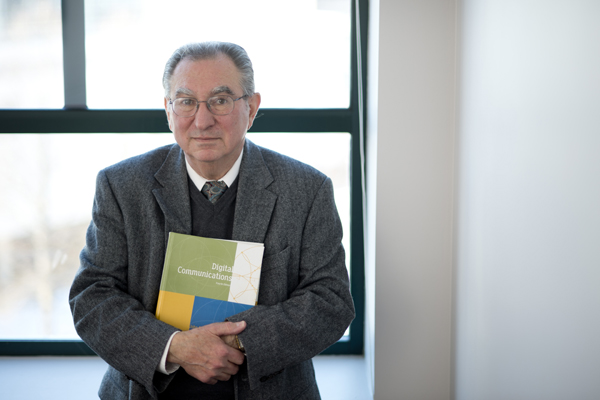Professor emeritus honored for engineering education career

Electrical engineering professor emeritus John Proakis has received nearly a dozen awards and academic honors in his time, but he considers his most recent one the defining achievement of his illustrious career: The James H. Mulligan, Jr. Education Medal, which recognizes engineering educators’ imagination, vitality, and leadership and represents the highest honor in education awarded by the Institute of Electrical and Electronics Engineers.
“It really is the culmination of the previous awards that I’ve received,” said Proakis, who began his Northeastern career more than four decades ago.
Over the last 40 years, Proakis has authored 10 telecommunications textbooks on topics ranging from satellite communication to underwater acoustic communication. His books are popular in college classrooms across the globe and have been translated into seven different languages.
He has worked with the top educational publishing houses, most recently editing an encyclopedia of telecommunications for John Wylie & Sons, Inc.
“Writing textbooks is a lot of fun,” said Proakis. “It’s a part of teaching—a way of presenting the material in a way that students can absorb it.”
While education has always been his central focus, Proakis has also been a long-time champion of the importance of research in academic learning. He hired some of the College of Engineering’s current distinguished researchers and several of his own graduate students have gone on to become world-leading researchers in their fields.
For instance, his former student Milica Stojanovic is a foremost authority on underwater acoustic communications and is now a professor of electrical and computer engineering at Northeastern.
With the help of Stojanovic and other lab members, Proakis has developed several methods for reliably transmitting, receiving, and decoding communications signals across a variety of channels. “The distortions and noise are different in different channels,” he said. “But the problem of receiving a signal and recovering the data is very similar.”
Since he retired in 1998, Proakis has remained on the faculty as a professor emeritus. In this role he has continued to write and conduct interdisciplinary research with many of his colleagues.
Proakis will officially receive the Mulligan award in a ceremony in Amsterdam in August 2014.





